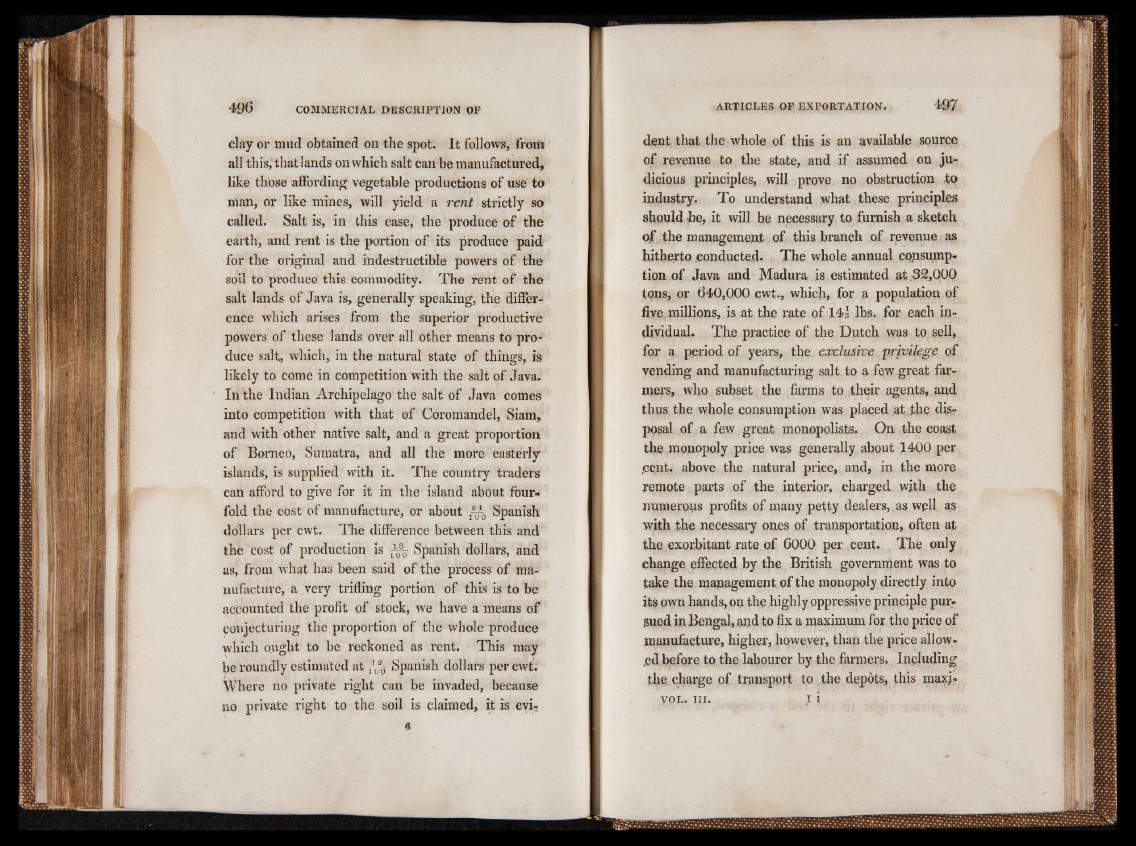
clay or mud obtained on the spot. It follows, from
all this,'that lands on which salt can be manufactured,
like those affording vegetable productions of use to
man, or like mines, will yield a rent strictly so
called. Salt is, in this case, the produce of the
earth, and rent is the portion of its produce paid
for the original and indestructible powers of the
soil to produce this commodity. The rent of the
salt lands of Java is, generally speaking, the difference
which arises from the superior productive
powers of these lands over all other means to produce
salt, which, in the natural state of things, is
likely to come in competition with the salt of Java.
In the Indian Archipelago the salt of Java comes
into competition with that of Coromandel, Siam,
and with other native salt, and a great proportion
of Borneo, Sumatra, and all the more easterly
islands, is supplied with it. The country traders
can afford to give for it in the island about fourfold
the cost of manufacture, or about Spanish
dollars per cwt. The difference between this and
the cost of production is Spanish dollars, and
as, from what has been said of the process of manufacture,
a. very trifling portion of this is to be
accounted the profit of stock, we have a means of
conjecturing the proportion of the whole produce
which ought to be reckoned as rent. This may
be roundly estimated at jm Spanish dollars per cwt.
Where no private right can be invaded, because
no private right to the soil is claimed, it is evident
that the whole of this is an available source
of revenue to the state, and if assumed on judicious
principles, will prove no obstruction -to
industry. To understand what these principles
should be, it will be necessary to furnish a sketch
of the management of this branch of revenue as
hitherto-conducted. The whole annual consumption
.of Java and Madura is estimated at 32,000
tons, or 640,000 cwt., which, for a population of
five millions, is at the rate of 14s lbs. for each individual.
The practice of the Dutch was to sell,
for a period of years, the exclusive privilege of
vending and manufacturing salt to a few great farmers,
who subset the farms to their agents, and
thus the whole consumption was placed at the disposal
of a few great monopolists. On the coast
the monopoly price was generally about 1400 per
cent, above the natural price, and, in the more
remote parts of the interior, charged with the
numerous profits of many petty dealers, as well as
with the necessary ones of transportation, often at
the exorbitant rate of 6000 per cent. The only
change effected by the British government was to
take the management of the monopoly directly into
its own hands, on the highly oppressive principle pursued
in Bengal, and to fix a maximum for the price of
manufacture, higher, hqwever, than the price allowed
before to the labourer by the farmers. Including
the charge of transport to the depots, this maxj